Queensland Police Service under fire for policy putting journalists on par with bikies and criminals
Queensland Police say it “will review” an internal directive adding journalists “incompatible with QPS values” to a declarable association policy including criminals. Read the latest
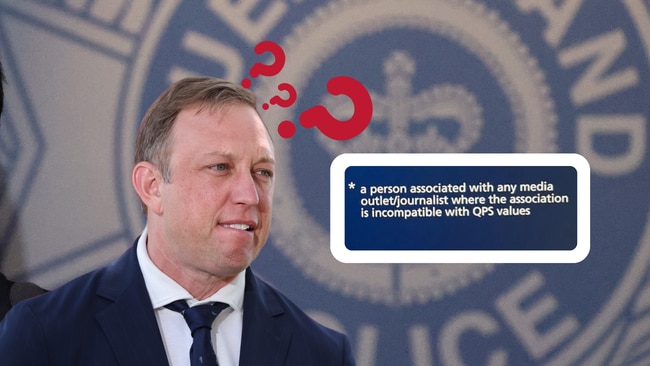
Gold Coast
Don't miss out on the headlines from Gold Coast. Followed categories will be added to My News.
The man tipped to be Queensland’s next Premier vows to overturn a police directive adding journalists “incompatible with QPS values” to a declaration list including criminals and religious extremists.
LNP leader David Crisafulli called the policy - leaked to the Bulletin this week and appearing to force Queensland Police Service staff to disclose out-of-work associations with journalists - “dangerous” and “chilling”.
Mr Crisafulli, speaking on Thursday, said if elected on October 26: “You bet that will be overturned.
“It’s dangerous. It’s chilling, and it shows you everything about the culture of the government in trying to suppress anyone who wants to tell the truth.
“We’ve now reached the point in Queensland where the government is so desperate to avoid scrutiny they reckon journalists are dangerous for telling the truth,” he claimed.
When first asked about it, Premier Steven Miles: “It doesn’t sound right to me, obviously, post Fitzgerald (Inquiry into the police), the police make a lot of decisions themselves, independent of government, but let me find out more about it.”
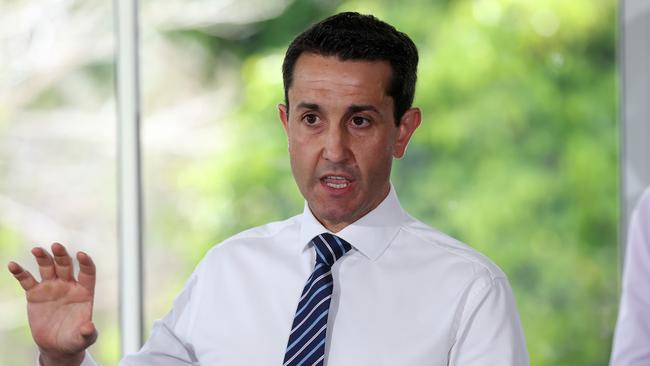
Later on Thursday he revised his response to call the directive “unacceptable”: “If elected in October, I’ll meet with the Police commissioner to ask for that policy to be changed. “I’ve always supported the critical role media plays in our democracy. That’s why I recently supported shield laws for journalists. “Media should not be included in the Queensland Police declarable associations policy. Media should not be listed alongside criminals, organised crime and extremist groups. It is unacceptable.” Their comments on Thursday, came after revelations the new police directive lumped journalists and media “incompatible with QPS values” to a declaration list that includes criminals, bikies and religious extremists. A screenshot from an updated QPS training module – the exact date is unclear – shows examples of declarable associations listed for staff:
●“A person suspected of being, or known to be engaged in criminal activity,” the video states;
● “A person who has a criminal history;
● “A person who is a member of a group or organisation involved in criminal activity;
● “A person, group or organisation with extreme political, social or religious views.
● “A person associated with any media outlet/journalist where the association is incompatible with QPS values.”
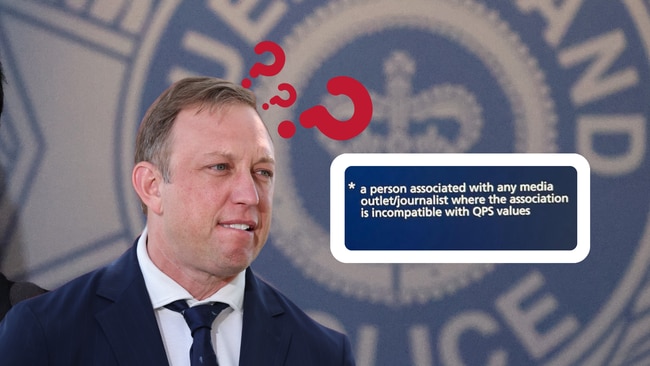
The training material is listed alongside a large image of journalists and media personnel at a media conference.
Asked on Thursday if it would pre-empt the major party leaders requesting it be axed after the election, a Queensland Police Service spokesperson said: “ ... the QPS acknowledges the current policy wording may cause confusion and, as such, will consider reviewing the policy.” The spokesperson response also said the “Declarable Associations policy” was “not a new policy and has existed in various reiterations for at least a decade”.
“It is an internal policy that seeks to clearly outline responsibilities relating to the reporting, recording, managing and auditing of declarable associations in the QPS; and minimise the risks presented by failing to identify and properly manage those associations by following the responsibility requirements.
“The policy does not list journalists or media outlets as associations that must be declared and in no way suggests that journalists or media outlets are collectively incompatible with the QPS values of integrity, respect and courage.
“A declarable association is unlikely to apply to any accredited news outlets or journalists operating in Australia,” the spokesperson said, adding: “Journalists/media outlets are listed as an example of an association an officer may consider declaring,only if the officer suspects the journalist/media outlet is incompatible with the QPS values.”
Over the weekend the QPS sent through an amended statement to say it “will review the policy” - advancing Thursday’s statement that it “will consider reviewing the policy”.
“QPS acknowledges the current policy wording may cause confusion and, as such, will review the policy and consider revising the wording to avoid any ambiguity,” the updated statement said.
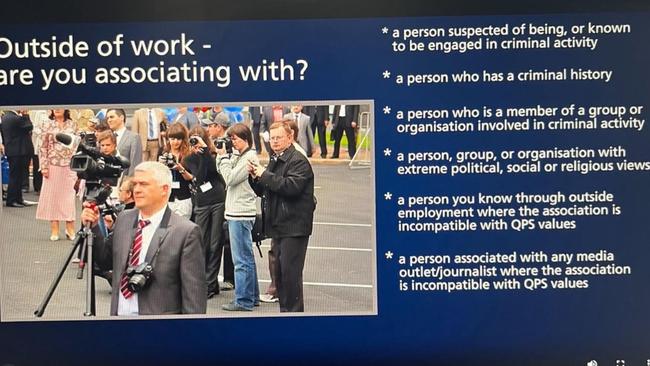
Bond University criminologist Dr Terry Goldsworthy had said this week the policy was “ludicrous” and against the intent of what it had been designed for.
“I do find it difficult to understand how having a relationship with someone in the media would fit within the definition,” Dr Goldsworthy said.
“This policy was put in place to deal with those staff who may have relationships with criminals or criminal organisations.
“This almost seems like a ham-fisted attempt to shut down bad news media stories that may be critical of the QPS.”
A QPS response on Wednesday to questions asking how a journalist could be incompatible with its values and who decided, a QPS spokesman said staff were obligated to uphold and protect the “reputational integrity” of the service.
“This policy encourages enduring conversations surrounding this topic between the person who is making a declaration and their supervisor. Conflicts of interest (actual, potential or perceived) can occur when private interests interfere, or appear to interfere, with a person being able to perform their official duties or work.”
‘OUTRAGEOUS’
“It is absolutely outrageous”, a former Queensland journalist who was pursued by the Crime and Corruption Commission (CCC) to reveal their sources, told the Bulletin.
“This is an extremely concerning move towards Queensland becoming a Police State” they said.
The then TV reporter, who legally can only be referred to as “Witness D”, was summoned to appear before the CCC’s star chamber twice in the early 2000s over a series of leaks from police sources.
Their refusal to reveal the identity of their source, landed Witness D in a legal battle which went all the way to the Supreme Court.
“It’s inconceivable that we are even talking about this - 16 years after I hauled before star chamber and threatened with being jailed” Witness D said.
“The public’s right to know depends on whistleblowers and other sources having confidence that they won’t be punished for dealing with a journalist.
“The reason I was able to reveal serious operational issues within the QPS was often that some police officers would talk to journalists like me and tell me about their concerns.
The same concerns have been expressed by Journalist F, another Queensland journalist hauled hauled before the CCC, and threatened with jail time for reusing to reveal the identity of a confidential police source.
“This policy is designed purely to silence hard-working police officers who want to expose incompetence, maladministration and wrong doing” Journalist F said.
“Issues like poor police morale, distrust with management and leadership, and falling officer numbers.”
In 2018, the veteran TV reporter was tipped-off from an officer about an impending raid on the home of a murder suspect, who was also the subject of a counter-terrorism investigation. The four-year legal battle by Journalist F to protect the identity of their informant, forced the State Government to introduce shield laws, protecting journalists from being compelled to reveal their sources.
“I was persecuted and prosecuted for simply doing my job” Journalist F said. “Now police officers face the same fate. What a disgrace.”
EARLIER
A new police directive adding journalists and media “incompatible with QPS values” to a declaration list that includes criminals, bikies and religious extremists is being dubbed “ludicrous”.
Leaked internal Queensland Police Service training material obtained by the Bulletin details how changes to the “declarable associations” policy seems to indicate officers should disclose a relationship with journalists “where the association is incompatible with QPS values” or face disciplinary action if they fail to.
“Any officer who is caught talking to a journalist could basically get in deep s**t” a senior Gold Coast police officer with decades of service on the frontline said.
“We could be investigated if they (QPS) deem the relationship incompatible with its values. That is a disgusting precedent solely intent on stopping the leaks and accountability.
“It’s akin to a communist regime. There is no other way to put it.”
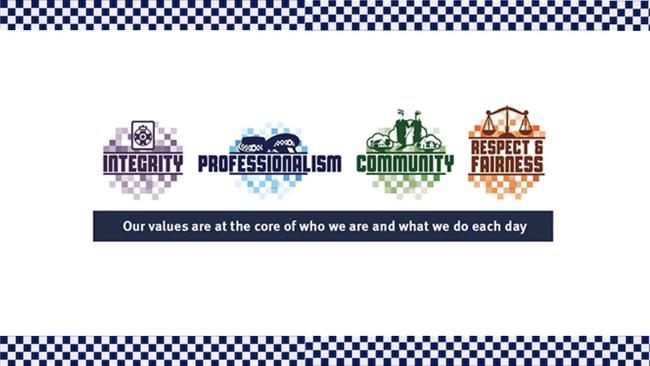
A screenshot from an updated QPS training module - it’s unclear what the exact date is - shows examples of declarable associations are listed for staff.
“A person suspected of being, or known to be engaged in criminal activity,” the video states.
“A person who has a criminal history.
“A person who is a member of a group or organisation involved in criminal activity.
“A person, group or organisation with extreme political, social or religious views.
“A person associated with any media outlet/journalist where the association is incompatible with QPS values.”
The training material is listed alongside a large image of what appear to be journalists and media personnel at a media conference.
Bond University criminologist Dr Terry Goldsworthy, an ex-detective, said the policy change was “ludicrous” and against the intent of what it had been designed for.
“I do find it difficult to understand how having a relationship with someone in the media would fit within the definition,” Dr Goldsworthy said.
“This policy was put in place to deal with those staff who may have relationships with criminals or criminal organisations.
“This almost seems like a ham-fisted attempt to shut down bad news media stories that may be critical of the QPS.”
The sentiment was shared by retired Chief Superintendent Jim Keogh who was responsible for leading the state’s crackdown on outlaw motorcycle gangs in the wake of the infamous 2013 Broadbeach brawl.
“It was primarily implemented for officers to declare their reasons for associating with high-end offenders” Mr Keogh said.
“To remotely consider journalists form or fit in any part of the ethos of ‘declarable associations’ is a terrible blight on the professionalism and ethics of journalists.
“They (journalists) are highly-trained professionals employed to deliver facts and information to the community and keep them informed of what’s going on.
“This policy could be seen as simply an attempt to control the narrative of speech of officers and linked to community disclosure.”
The QPS values are integrity, professionalism, community, respect and fairness. The journalist code of ethics, as outlined by the industry’s peak body, the Media Entertainment and Arts Alliance, requires members to commit themselves to honesty, fairness, independence and respect for the rights of others.
The Bulletin asked Queensland Police Service how a journalist could be incompatible with its values and who within the service was responsible for making the determination.
A spokesman responded: “The Declarable Associations is an internal policy which applies to all police personnel who are employed by the Queensland Police Service (QPS), including police officers, police recruits and staff members.
“It also includes those who are engaged by the QPS in a work-related capacity, including contractors in temporary employment of the QPS, people seconded from other departments or jurisdictions, volunteers in policing and research students on contract. It includes those who are stood down or suspended from duty, or on any type of leave, including unpaid leave.
The spokesperson added: “Queenslanders have expectations of high standards of integrity, ethics and professionalism from their police service, mirrored in the QPS values of integrity, respect and courage. Everyone is expected to uphold and protect the reputational integrity of the QPS by advising of, and risk managing through a Risk Management Plan (RMP), any declarable association.
“This policy encourages enduring conversations surrounding this topic between the person who is making a declaration and their supervisor/manager/officer in charge.
“Conflicts of interest (actual, potential or perceived) can occur when private interests interfere, or appear to interfere, with a person being able to perform their official duties or work. They can be quite obvious, but also can happen whether or not the person is aware of the conflict of interest or if they personally think there is no conflict. A declarable association is a type of conflict of interest and this policy exists to address and mitigate the risks that attach to such an association.
“The policy is designed to: 1) assist people to identify and declare those associations that do, or have the potential to, give rise to a conflict of interest; 2) provide a process by which such associations are recorded, risk assessed and cooperatively managed by the declarant and the QPS; and 3) mitigate against harm to the community and to the reputation and integrity of the person, their colleagues and the QPS.
“Just having a declarable association is not a breach of this policy, the ‘Code of Conduct for the Queensland Public Service’, or the ‘QPS Standard of Professional Practice’ and may be common over the course of someone’s working life.
“Considerations regarding everyone’s right to privacy and freedom of association are acknowledged by the QPS. A declarable association may arise regardless of someone’s actions or decisions. Eg: by way of marriage, birth or a relationship. Sometimes declarable associations, especially family related ones, can significantly pre-date the declarant coming to work for or with the QPS.
“Declarable associations may exist via a personal association or by way of social networks, including on social media platforms. It is the responsibility of everyone to whom this policy applies to take reasonable steps to identify and avoid situations that could give rise to a conflict of interest for them. It may be necessary for the person to opt out of contact with some friends, social groups, clubs or organisations because the association is entirely
incompatible with their occupation.
An allegation of misconduct may arise if:
• there is a failure to respond to a managerial direction; and/or
• there is a breach of a Risk Management Plan (RMP); and/or
• behaviour occurs that is irretrievably incompatible with the values of the QPS.
“Knowing, suspecting or recognising in any way the association does not automatically mean the person has engaged in a form of misconduct or behaviour that renders them unable to continue the association or engaging with or working for the QPS. In every case however it will trigger an obligation to report the association so, depending on the circumstances, steps can be taken to record, assess, action, manage and audit the association.”
More Coverage
Originally published as Queensland Police Service under fire for policy putting journalists on par with bikies and criminals





